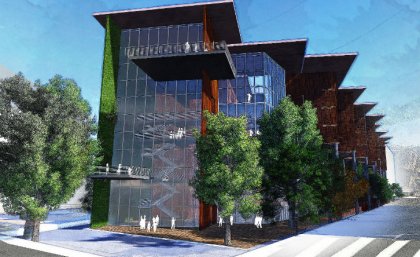
University of Queensland student teams have had success in two international sustainable design competitions.
The teams secured first and second place in the Generation Kingspan competition, known as GenK, in which they were challenged to design an urban, mid-rise, mixed-used complex for a project site in Washington DC.
In a separate contest – the invitation-only Tohoku Recovery International Competition – UQ was the only Australian university in the final shortlist of 13, which included Harvard and MIT. The UQ team’s submission claimed third place.
The head of the UQ School of Architecture, Professor Sandra Kaji-O'Grady, said she was delighted the students had placed so well.
“Design competitions are a significant part of contemporary architectural practice,” she said.
“Open competitions can give emerging architects opportunities they might not have otherwise. Clients like competitions because they can yield fresh ideas and unexpected solutions.
“When students have competition success, it’s a great boost for their confidence and for their résumés.
“This type of competition reinforces the fact that our students are as talented and well trained as any in the world.
“These recent wins show our students can respond imaginatively to challenges beyond their first-hand experience. We are very proud of them.”
In the GenK contest, Luis Sidonio (team leader), Suzie Robinson, Sarah Binns and Zach Brown, all UQ Master of Architecture students, won the $5000 grand prize for creating a DC Visitor & Sustainability Cultural Centre.
The centre features a range of sustainability features, including solar and geothermal renewable energy systems, to reduce reliance on non-renewable energy sources.
In the same competition, UQ students Stefano Tirocchi (team leader), Merrille Antalan, Rebecca Jordan and Phil Maerky won second place and $4000 for their project: The Hill, the Washington DC Sustainability Hub.
More information about the competition and the winning entries is available here and here.
An expert in sustainable design, Dr Marci Webster-Mannison, said winning the GenK competition demonstrated the students’ ability to creatively and critically address complex challenges facing built environment professionals.
“UQ prioritises sustainability as a research strength and integrates passive design research into teaching, with input from practising architects and engineers – in particular from structural engineer Greg Killen and mechanical services engineer Brett Beeson,” she said.
In the Japanese competition, the UQ team’s prizewinning submission was titled Architecture of Recovery: A Framework for an Alternative Future.
Professor Luis Feduchi, who advised the students during the development of their submission, said UQ was one of only 13 universities around the world that was handpicked to participate.
“The competition aims to foster innovative and creative ideas in the use of Public Private Partnerships and other new ideas for the revitalisation of the Tohoku region affected by the 2011 Great East Japan Earthquake and Tsunami,” Professor Feduchi said.
“As a result of the prize, team representatives will visit Tokyo and the Tohoku region.
“They will present their competition submission to a formal meeting of the Kahoku Shinpo and the Tohoku Revitalisation Committee.”
Team members were Jaydn Bowe, Andrew Campbell, Elliot Harvie, Bradley Kerr, Michael Martin, Thomas O’Shea, Georgina Russell, Luis Sidonio, Chi Tang, Tamarind Taylor and Elspeth Webster.
More information about the competition and the students’ submission is here.
Media: Professor Sandra Kaji-O’Grady, ph +61 7 3365 3843, sandra.kajiogrady@uq.edu.au
.jpg)



